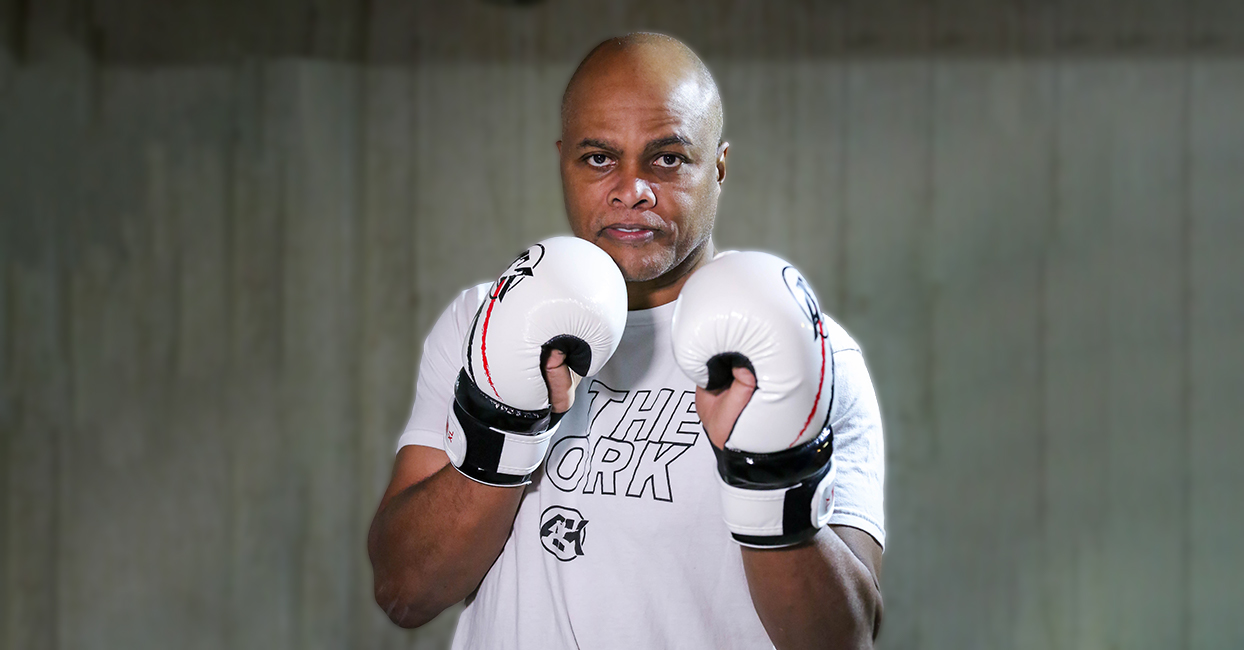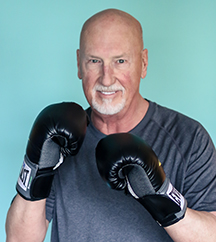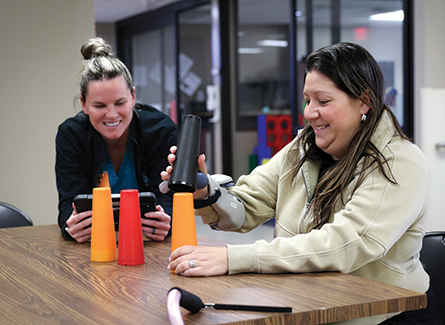
From running dozens of daily errands to working out and traveling the world with her husband, Dave, Jessica Porkka, 41, was used to having a jam-packed schedule. As Jessica juggled her busy life and family responsibilities, she allowed health issues, like her high blood pressure, to slip to the bottom of her to-do list.
However, when a series of high-stress situations led to a hemorrhagic stroke, her active life came to a screeching halt.
“I had been through so much that I think my body decided that it was time for a break, whether I wanted to take one or not,” Jessica said.
A hemorrhagic stroke occurs when a weakened blood vessel in the brain ruptures and leaks, causing pressure and damage. The most common cause of this type of stroke is high blood pressure, also known as hypertension.
Buildup to Misfortune
A few years before her stroke, her doctor prescribed blood pressure medication.
In 2020, when her husband’s job transferred their lives from North Carolina to Minnesota, she never renewed her prescription hoping she could keep it under control without the medication.
In early 2022, Jessica’s father was diagnosed with Alzheimer’s disease, leading to numerous hospitalizations. To be there for her father, she flew to Florida several times to help care for him.
In December 2022, Dave’s job uprooted them again. A few days after their move from Minnesota to Kansas City, MO, Jessica’s father died. She experienced her stroke less than two weeks later.
Starting From Scratch
Health Expert
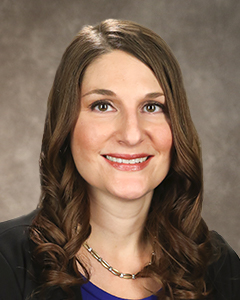
Shannon Kohake, MD
Neurologist
816.472.5157
Learn more at
MeritasHealth.com/SKohake.
After Jessica arrived at North Kansas City Hospital’s Emergency Department, she spent two days in the Intensive Care Unit, six days in a regular inpatient room and nearly four weeks in Acute Inpatient Rehabilitation. When she started her journey through rehab, Jessica had lost a lot of core strength and feeling on the right side of her body.
“Her stroke impacted her quite a bit,” said Shannon Kohake, MD, neurologist with Meritas Health Neurology. “When she came in, Jessica didn’t have much use of her right side and wasn’t able to sit without support.”
Jessica’s care team worked together to develop a treatment plan, which included occupational, physical and speech therapies to help her be as independent and functional as possible before returning home. In her daily therapy sessions, she worked on walking, climbing stairs, building up her arm strength and performing daily tasks.
Jessica’s care team fit her for an ankle foot orthosis brace to help keep her leg in line, maintain her balance and protect her joints while she walked. After three and a half weeks in rehab, her care team was astounded with her progress.
“On the first day, she was barely able to shrug her shoulder,” said Meghan Dyster, OTD, OTR/L, an occupational therapist in NKCH and MH’s Acute Rehab. “By the time she left, she had a lot more use of her right arm and hand and was walking with minimal support. Her progress was truly incredible.”
When Jessica left Acute Rehab, she attended an outpatient rehabilitation center to continue building her strength. This additional rehab helped increase her level of independence. She progressed to showering without a chair and walking with a cane, rather than a walker.
Immense Gratitude
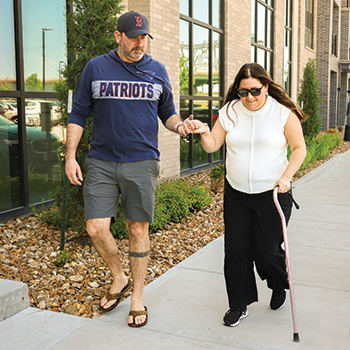 Jessica is back to driving and working, but she still has work to do until she’s back to 100%. She is now making her health a priority.
Jessica is back to driving and working, but she still has work to do until she’s back to 100%. She is now making her health a priority.
“I check my blood pressure all the time now,” Jessica said. “My care team got my medications figured out and my numbers are always within the normal range. Meds, along with the home exercises, help me inch closer to my old life every day.”
She is thrilled with the progress she’s made so far and attributes much of her progress to the support she received while in Acute Rehab.
“Daily therapy in rehab made such a big impact after such a traumatic event,” Jessica said. “I don’t think I’d be where I’m at without the amazing therapists, doctors and staff.”
Shocking Stroke Statistics
Stroke is the leading cause of serious long-term disability in the U.S.
- Every 40 seconds someone has a stroke.
- About 23% of stroke victims have had a previous stroke.
- 1 in 19 deaths is caused by a stroke.
- Nearly half of all American adults have high blood pressure, one of the leading causes of a stroke.
Source: Centers for Disease Control and Prevention
Many people believe strokes only affect seniors and those 65 and older, but strokes can and do occur at any age. Much of this comes from increasing rates of high blood pressure and unhealthy habits that put younger adults at a higher risk.
Risk Factors
If you have any of these risk factors, talk to your primary care provider to learn how to reduce your risk of stroke.
- Diabetes
- Excess weight or obesity
- High blood pressure or cholesterol
- Inactive lifestyle
- Smoking
- Unhealthy diet
Up to 80% of strokes are preventable.
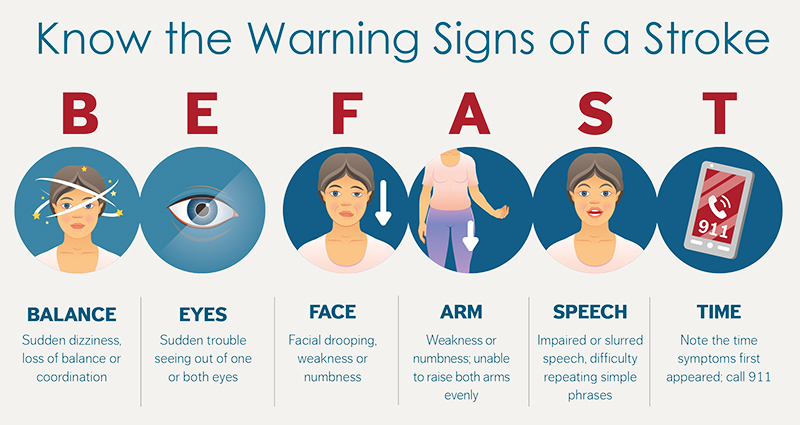
Care You Can Count On
When it comes to North Kansas City Hospital and Meritas Health, you can expect the best in stroke care. As a Joint Commission-certified Primary Stroke Center, we meet the high standards set by The Joint Commission, American Heart Association and American Stroke Association.
Related Articles

March 8, 2020
3 Sneaky IBS Triggers
For people with irritable bowel syndrome, spring may spark a flare-up in symptoms

May 30, 2024
5 Nutrition Tips for a Healthier Lifestyle
Healthy eating and proper nutrition play a big part in maintaining good health. Here's how to improve your nutrition habits.
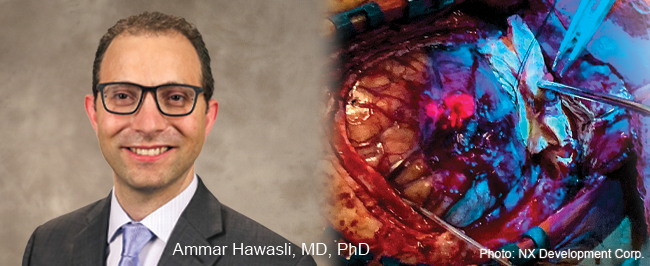
July 7, 2021
5-ALA Fluorescence Guides Neurosurgeons for More Complete Resections
Neurosurgeons Ammar Hawasli, MD, PhD, and Stephen Reintjes Jr., MD, with Meritas Health Neurosurgery, are now using a progressive treatment that allows for the more precise removal of malignant gliomas and glioblastomas.
